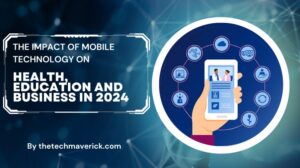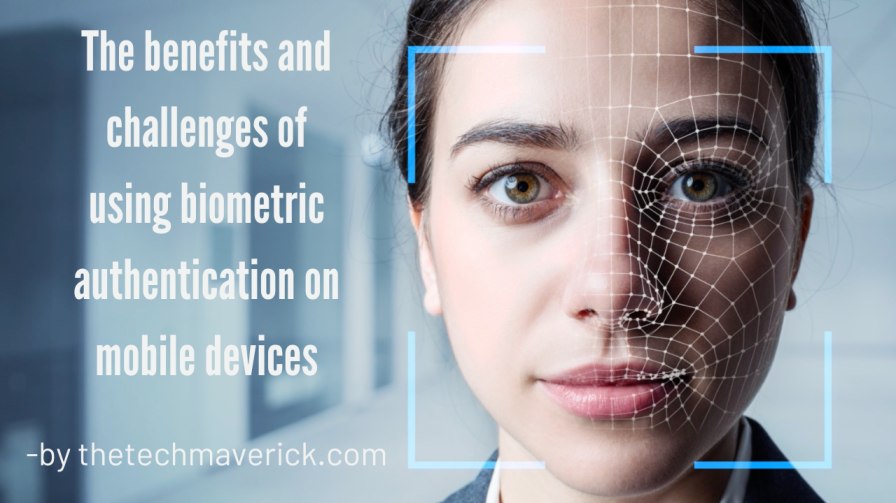The Impact of Mobile Technology on Health, Education and Business in 2024

Introduction
Mobile technology has brought significant changes to the way society operates, and in 2024, its impact on health, education, and business will be more profound than ever before. Advancements in mobile technology provide a range of opportunities to improve access, enhance productivity, and deliver better services to the community. This article delves into the impact of mobile technology on health, education, and business in 2024.
Mobile Technology Trends in 2024
Mobile technology has become an essential part of everyday life, and its influence is set to continue growing in 2024. From improved smartphone capabilities to communication enhancements and advanced artificial intelligence and augmented reality technology, the mobile industry is rapidly evolving.
Advancements in Smartphone Technology
In 2024, smartphones are expected to offer more advanced features, including longer battery life, better processing power, and enhanced camera capabilities. The inclusion of foldable screens and 5G technology is set to change the landscape of smartphone manufacturing, introducing new design elements and improving user experiences.
Internet Connectivity
With the rise of IoT devices, the need for reliable and fast internet connectivity is more important than ever. In 2024, trends indicate that the internet of things will be a seamless and essential part of life, with the need for high-speed, stable connections in every corner of the planet. Smart cities, healthcare devices, and autonomous vehicles are a few scenarios that are expected to benefit from ultra-fast internet connectivity.
Increased Integration of Artificial Intelligence (AI) and Augmented Reality (AR) Technology
Mobile technology is set to make significant advancements towards artificial intelligence and augmented reality integration in the year 2024. AI integration will result in highly personalized user experiences, while AR technology will revolutionize mobile gaming and e-commerce experiences. Additionally, AR technology will be used to train employees, provide real-time translations, and enhance communication and collaboration, among other things.
“Mobile technology is set to make significant advancements towards artificial intelligence and augmented reality integration in the year 2024.”
In conclusion, the trends in mobile technology for 2024 are truly transformative, with advancements in smartphone technology, internet connectivity, and the integration of AI and AR technology. The developments in these areas will not only enhance user experiences, but they will also open up new possibilities in various sectors such as healthcare, education, and business. The mobile industry has disrupted many practices and norms, and the emerging trends are expected to continue shaping the future of technology.
Mobile Technology and Health Benefits
The impact of mobile technology on healthcare delivery has been momentous in the past decade. The use of mobile applications (apps), wearables, and telemedicine has enhanced patient engagement, improved access to medical information and enhanced remote patient monitoring. As a result, patients are increasingly empowered to take control of their health and well-being.
| Type of Mobile Technology | Benefits |
| Mobile Apps | Increased access to medical information, medical reminders and mobile payments for medical bills. |
| Wearables | Real-time monitoring of vital signs, physical activity levels and sleep patterns. |
| Telemedicine | Increased access to medical professionals, remote consultations, and better management of chronic conditions. |
The use of mobile technology in healthcare is expected to continue growing rapidly, with advances such as 5G technology facilitating faster and more reliable remote connectivity, innovation in mobile healthcare apps, and the introduction of mobile diagnostic tools all set to transform healthcare in the coming years.
Mobile Technology in Education
Mobile technology is changing the way students learn and engage with educational content. With the increasing reliance on smartphones and tablets in classrooms, students are gaining new opportunities to collaborate, explore, and personalize their learning experiences.
Smartphones and Tablets in Classrooms
The use of smartphones and tablets in classrooms is on the rise, creating new opportunities for educators to engage students in interactive and immersive learning activities. By leveraging the portability and versatility of mobile devices, students can access a rich repository of educational resources, such as e-books, videos, and simulations, in real-time and on-the-go. Moreover, mobile technology enables collaborative learning experiences, allowing students to interact with their peers and teachers in a seamless and dynamic way.
Online Learning Platforms
The rise of online learning platforms is another example of how mobile technology is transforming education. With the proliferation of Massive Open Online Courses (MOOCs) and other digital learning platforms, students can access high-quality educational content from around the world at their convenience.
These platforms provide flexible and personalized learning paths, allowing students to set their own pace and learn at their own comfort levels. Additionally, online learning platforms offer a range of interactive features, such as quizzes, assignments, and discussion forums, to enhance student engagement and retention.
Mobile Apps for Enhanced Learning
Mobile apps are also playing an increasingly important role in enhancing student engagement and learning outcomes. From gamification to personalized learning experiences, mobile apps offer a multitude of features and functions to cater to the diverse learning needs and preferences of students. For example, educational games can make learning more fun and interactive, while language learning apps can provide students with instant feedback and correction on their pronunciation and grammar.
Mobile Technology in Education
| Benefits | Challenges |
| Increased access to educational resources | Technological distractions and inequities |
| Enhanced student engagement and collaboration | Security and privacy concerns |
| Personalized and flexible learning experiences | Resistance to change and uncertainty |
Mobile Technology and Business Growth
Mobile technology has revolutionized the way modern businesses operate. The widespread adoption of smartphones and tablets has enabled professionals to work remotely, stay connected, and access relevant data on the go. The integration of mobile devices, communication platforms, and productivity tools has transformed the traditional office setup and enabled seamless collaboration and coordination in real-time.
Mobile technology has also opened up new opportunities for businesses to connect with customers and enhance their engagement. Social media platforms and mobile apps have increasingly become critical marketing tools, enabling businesses to interact with customers and build long-lasting relationships. This technology has also facilitated the rise of e-commerce, allowing businesses to sell products and services through online platforms and expand their customer base beyond geographical boundaries.
Mobile Technology and Education Innovation
Mobile technology is revolutionizing the education sector, providing students and educators with innovative tools for teaching and learning. With the rise of smartphones and tablets, education apps, and gamification, traditional methods are becoming outdated, and new opportunities to enhance student engagement, creativity, and learning outcomes are presenting themselves.
Mobile apps
Mobile apps have become essential tools for students, providing them with access to a wealth of educational resources at their fingertips. Apps such as My Study Life, EasyBib, and Grammarly offer students comprehensive study and organization tools, improving productivity and streamlining workflow. Moreover, mobile apps offer access to courses and materials at any time and anywhere, ensuring that learning is no longer confined to a single physical location.
Gamification
Gamification is another form of mobile technology that is transforming the education sector. By incorporating game-like elements into learning experiences, students are given incentives to engage in educational activities, resulting in improved performance and long-term retention of knowledge. Games such as Kahoot, Quizlet, and Duolingo allow students to learn in a fun, interactive way that prioritizes mastery and rewards progress.
Personalized learning
With mobile technology, educators have more opportunities to personalize learning experiences for students. Using learning management systems such as Canvas and Blackboard, teachers can track students’ progress, identify areas of weakness, and tailor instruction accordingly. Moreover, mobile technology facilitates remote learning, allowing students to learn at their own pace, place, and time, making education more accessible and equitable for all.
Future of Mobile Technology in 2024
The future of mobile technology looks bright in 2024, with exciting advancements in several areas. One area of note is the growth of 5G technology, which will offer faster internet speeds and seamless connectivity to a wide range of mobile devices. This will make it easier for users to access and share data in real-time, allowing for greater efficiency and productivity.
| Advancements in Mobile Technology | Implications for Health, Education, and Business |
| 5G technology | Faster internet speeds, greater efficiency of data transfer and access |
| Internet of Things (IoT) | Increased interconnectedness, real-time data and insights, streamlined processes |
| Mobile security | Improved protection against cyber threats and data breaches |
Impact of Smartphones on Health
Smartphones have become ubiquitous in modern society, with many people relying on them for various tasks throughout the day. While they offer convenience and connectivity, they also bear potential health risks. This section will explore the impact of smartphones on health and strategies for maintaining a healthy balance in the digital age.
Physical Health
Extended use of smartphones can lead to physical health problems, such as neck pain, eye strain, and decreased sleep quality. According to a study by the American Academy of Pediatrics, excessive smartphone use has been linked to obesity, as users often become less physically active.
It is essential to take regular breaks and stretch to prevent long-term postural damage. Additionally, blue light emitted by the screens can disrupt sleep patterns. Consequently, it is recommended to avoid using smartphones right before bedtime.
Mental Health
The increasing use of smartphones is also linked to potential mental health issues such as anxiety, depression, and addiction. Research has shown that social media usage and excessive screen time can cause users to develop addictive behaviors and experience feelings of anxiety and loneliness.
To maintain mental health, users are encouraged to limit overall screen time usage and monitor their social media activity. Placing time restrictions on phone usage can range from taking a ten-minute break every hour, to completely disconnecting from technology during meals and bedtime hours.
Conclusion
Mobile technology is expected to have a significant impact on health, education, and business in 2024. From trends and innovations to potential benefits and challenges, this article has explored the profound changes that mobile technology will bring to society’s daily dynamics.
Emerging trends in mobile technology will shape the way people communicate and work. The integration of artificial intelligence and augmented reality, and advancements in internet connectivity and smartphone technology will create new opportunities for innovation and growth.
As mobile technology continues to evolve, its influence on society’s daily dynamics will undoubtedly reshape the way we live, learn, and do business in the years to come. The impact of mobile technology on health, education, and business in 2024 will be significant.
FAQ
What is the impact of mobile technology on health, education, and business in 2024?
Mobile technology is expected to have a profound impact on health, education, and business in 2024. It will bring advancements, trends, and potential benefits to these sectors, revolutionizing healthcare delivery, enhancing educational experiences, and driving business growth and competitiveness.
What are the emerging mobile technology trends in 2024?
In 2024, mobile technology trends include advancements in smartphone technology, internet connectivity, and the integration of artificial intelligence and augmented reality. These trends will shape the way we interact with mobile devices and utilize them in various aspects of our lives.
How does mobile technology benefit health?
Mobile technology has positive impacts on health by transforming healthcare delivery through mobile apps, wearables, and telemedicine. These advancements improve access to information, empower individuals to take control of their well-being, and enable remote healthcare consultations.
What is the role of mobile technology in education?
Mobile technology is revolutionizing education by enabling increased reliance on smartphones and tablets in classrooms, facilitating online learning platforms, and enhancing student engagement and learning outcomes through mobile apps and personalized learning experiences.
How does mobile technology contribute to business growth?
Mobile technology contributes to business growth by enabling remote work, streamlining operations, and enhancing customer engagement through mobile devices, productivity apps, and communication platforms. This technology helps businesses become more efficient and competitive in the digital age.
How does mobile technology foster innovation in education?
Mobile technology fosters innovation in education by facilitating the use of mobile apps, gamification, and personalized learning experiences. These tools reshape traditional education models, promote interactive and engaging learning environments, and prepare students for future workforce demands.
What can we expect from the future of mobile technology in 2024?
In the future of mobile technology in 2024, we can anticipate advancements in 5G technology, the Internet of Things (IoT), and mobile security. These advancements will have implications for health, education, and business, shaping how we connect, communicate, and access information through mobile devices.
What is the impact of smartphones on health?
Smartphones have both positive and negative impacts on health. While they provide access to health-related information, fitness tracking, and telemedicine, excessive smartphone use can lead to digital addiction, mental health issues, and physical discomfort. It is important to maintain a healthy balance in smartphone usage.
How do smartphones contribute to businesses?
Smartphones play a vital role in businesses by serving as indispensable tools for communication, productivity, and mobility. Professionals in various industries rely on smartphones for tasks such as email communication, accessing work-related apps, and staying connected with colleagues and clients on the go.
How does mobile technology impact businesses?
Mobile technology impacts businesses by transforming various industries, such as retail, healthcare, and finance. It improves operations, enhances customer experiences, and drives overall competitiveness through innovative mobile apps, efficient communication platforms, and seamless access to data and services.



Pingback: The pros and cons of different types of mobile operating systems